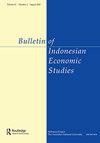管理复苏,抓住改革机遇
IF 2.3
2区 经济学
Q1 AREA STUDIES
引用次数: 10
摘要
新冠肺炎引发的经济危机最严重的时期似乎已经过去,2020年下半年经济收缩有所缓解。尽管与同行国家的经济衰退相比,印尼的经济衰退幅度不大,但印尼对疫情的处理一直很欠缺。疫情爆发近一年后,随着每天报告的新增病例数量持续上升,该国仍在与第一波感染作斗争。面对政府处理疫情的批评,总统佐科·维多多于2020年底改组了内阁。本次调查考察了印度尼西亚从疫情影响中恢复的时间比预期的要长的计划。我们看到,大部分劳动力市场正在通过转向农业部门来适应广泛的就业损失。我们还看到非正规就业增加,导致失业率低于预期。我们认为,疫情加剧了印度尼西亚长期存在的结构性问题。除了应对眼前的危机问题,政府还必须开始应对中期挑战,抓住改革机遇。我们讨论了现有的复苏政策,包括疫苗接种战略和关于创造就业的综合法律。我们认为,仅靠综合法是必要的,但不足以改善投资环境,为经济复苏和长期结构转型创造就业机会。本文章由计算机程序翻译,如有差异,请以英文原文为准。
Managing Recovery and Seizing Reform Opportunities
The worst of the Covid-19-induced economic crisis appears to be behind Indonesia, with the economic contraction lessening in the second half of 2020. While the economic downturn in Indonesia has been modest compared with downturns in peer countries, Indonesia’s handling of the pandemic has been lacking. Almost a year into the pandemic, the country was still struggling with the first wave of infection as the number of new cases reported each day continued to rise. Facing criticism over the government’s handling of the pandemic, President Joko Widodo reshuffled his cabinet at the end of 2020. This Survey examines Indonesia’s plans to manage a longer-than-expected recovery from the effects of the pandemic. We see that much of the labour market is adjusting to widespread loss of employment by shifting into the agricultural sector. We also see an increase in informal employment, leading to a lower unemployment rate than expected. We argue that the pandemic has exacerbated Indonesia’s long-standing structural problems. In addition to responding to the immediate crisis issues, the government must start addressing medium-term challenges and seizing reform opportunities. We discuss the existing recovery policies, including the vaccination strategy and the omnibus law on job creation. We argue that the omnibus law alone is necessary but will not be enough to improve the investment climate and create jobs for economy recovery and long-term structural transformation.
求助全文
通过发布文献求助,成功后即可免费获取论文全文。
去求助
来源期刊

Bulletin of Indonesian Economic Studies
Multiple-
CiteScore
9.20
自引率
9.80%
发文量
18
期刊介绍:
The Bulletin of Indonesian Economic Studies, a peer-reviewed journal published by the Indonesia Project at The Australian National University"s College of Asia and the Pacific, fills a significant void by providing a well respected outlet for high-quality research on any and all matters pertaining to the Indonesian economy, and touching on closely related fields such as law, the environment, government and politics, demography, education and health. In doing so, it has played an important role in helping the world, and Indonesians themselves, to understand Indonesia.
 求助内容:
求助内容: 应助结果提醒方式:
应助结果提醒方式:


